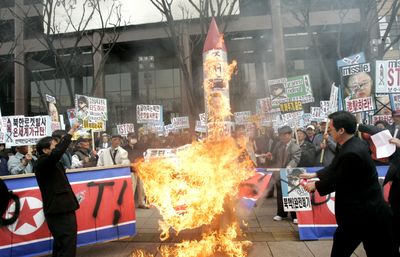North Korean rocket ready
U.S., others fear launch is really missile test

SEOUL, South Korea – North Korea said preparations to launch a satellite were complete today and liftoff was imminent, as U.S., Japanese and South Korean warships with radar plied waters near the communist nation to monitor what they fear is a long-range missile test.
Spy satellites trained high-resolution cameras on a coastal launch pad for a launch the North earlier advised international authorities would take place sometime between today and Wednesday.
“Preparations for launching ‘Kwangmyongsong-2,’ an experimental communications satellite, by carrier rocket ‘Unha-2’ have been completed at the satellite launching ground in the east coastal area,” the state-run Korean Central News Agency reported, citing information from the Korean Committee of Space Technology. “The satellite will be launched soon.”
North Korea is pressing ahead despite mounting international pressure to call off a launch President Barack Obama said Friday would be “provocative.”
“Respective nations made efforts to urge North Korea to refrain from the launch. But if North Korea really plans to launch, it is very regrettable,” Japanese Foreign Minister Hirofumi Nakasone told reporters today.
Washington, Seoul and Tokyo suspect North Korea’s real motive is to test its long-range missile technology. The plans have sparked alarm because North Korea has acknowledged it has nuclear weapons and has repeatedly broken promises to shelve its nuclear program or halt rocket tests.
Obama, appearing with French President Nicolas Sarkozy in Strasbourg, France, said the launch should be stopped. The American president said the U.S. will “take appropriate steps to let North Korea know that it can’t threaten the safety and security of other countries with impunity.”
U.S., Japan and South Korea deployed warships with radar and other surveillance equipment in the waters near the communist nation to monitor the launch.
Efforts to persuade North Korea to give up the plan continued, though there were no signs of a last-minute diplomatic breakthrough.
U.N. Security Council diplomats, anticipating a weekend emergency session if the launch proceeds, said a draft resolution had begun circulating that could essentially reaffirm and tighten enforcement of the demands and sanctions of a resolution passed in October 2006 after a North Korean nuclear test.
The North has said its rocket will fly over Japan, its first stage expected to fall in waters less than 75 miles from Japan’s northwestern shore and the second stage dropping in the Pacific between Japan and Hawaii.